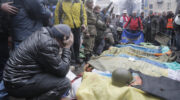Cooperation Europe
Isolated from West, Russia looks to Africa as land of opportunity
| View caption Hide caption
Shunned by the West over its war in Ukraine, Russia is looking to Africa to find new international partners. And, lacking colonial history on the continent, Moscow is finding a more welcoming audience.
Still, the Kremlin seems to be facing a headwind, at least temporarily, in part because of that war. Just 17 African heads of state attended the July summit presided over by Mr. Putin, far down from the 43 who showed up for the first such meeting in 2019. Some delegates expressed dismay over Russia’s renewed blockade of Ukrainian grain exports, which threatens to drive up global food prices.
But Russia’s trade with Africa is growing rapidly, as are political and security cooperation in many areas, and events like the coup in Niger illustrate the potential for Moscow to expand its influence at the expense of the Western powers that have traditionally dominated the continent.
“The growing importance of Africa is part of a reorientation of Russian foreign policy toward the non-Western world, or what Russia calls the ‘global majority,’” says Dmitry Suslov, a foreign affairs expert with the Higher School of Economics in Moscow. “Russian relations with the West are in total collapse, and are unlikely to recover in the foreseeable future. Russian policy toward the West these days is to mitigate risks, limit the damage to ourselves, and inflict damage on them. Positive policies, involving trade and cooperation, are only directed toward non-Western countries. Africa is a critical element of the non-West in Russian eyes.
“Africa has huge potential for economic growth,” Mr. Suslov adds. “It’s a natural partner for Russia, which has never been a colonial power in Africa. We have a lot to offer of what Africa needs, including agricultural goods, fertilizers, arms, and security assistance.”
View caption Hide caption
A changing attitude
The new level of diplomatic outreach was on full display at the July St. Petersburg meeting, where Mr. Putin held a special session with several African leaders to hear their concerns about Russia’s war in Ukraine and to assure them that Moscow is open to peace negotiations.
“I know that you are earnestly seeking to provide assistance in reaching a just and sustainable solution to the conflict,” he told them. “We greatly appreciate your balanced approach, as well as the fact that you have not supported the anti-Russian rhetoric and anti-Russian campaign.”
Mr. Putin also sought to defuse criticisms over Russia’s blockade on Ukrainian grain by offering to step up Russian food exports, including providing thousands of tons of free grain to six African countries.
Until the crisis around Ukraine erupted in 2014, Russian involvement in Africa was mostly represented by Russian companies competing with many other global interests for access to African resources. The former Soviet Union’s ideological interests seemed long gone, along with most of its political and military clout on the continent.
“Lately Moscow has wanted to improve relations on various levels with African countries, to change the attitude toward Russia. We are ready to invest in that,” says Ivan Loshkaryov, an Africa expert with MGIMO University, which trains Russian diplomats. State-to-state relations are getting more attention, but Russian universities are also stepping up their exchanges with African counterparts, and Russian cultural centers are being established in many countries.
Russia is also increasingly an arms supplier to African countries, primarily Algeria and Egypt. But in recent years it has also retailed security services to countries like Mali, Sudan, Burkina Faso, the Central African Republic, and Angola.
Much attention has focused on the private Wagner forces, the biggest of several Russia-based private military contractors, who’ve been active in the Sahel region. Dr. Loshkaryov says that formal military cooperation involving Russia’s Ministry of Defense has lately become important, and is likely to become more so in the wake of Wagner chief Yevgeny Prigozhin’s demise.
Moscow is also taking on at least a whiff of the former Soviet Union’s ideological appeal, riding on the anti-Western and especially anti-French feelings surging in impoverished and conflict-ridden West African and Sahel countries. There have been nine attempted coups – five of them successful – in the region in the past three years, with new military regimes wielding potent anti-colonial rhetoric.
View caption Hide caption
“Widening our circles of friends”
Andrey Klimov, deputy head of the international affairs committee of the Federation Council, Russia’s upper house of parliament, says the West itself is to blame for the growth of resentments among Africans over neocolonialism.
“I visit Africa often in the framework of my inter-parliamentary work, and I know that a lot of discussions are going on” about neocolonialism and economic exploitation, he says. “Especially in the past three years, Russia’s approach to Africa has become extremely serious.”
Experts estimate that there are at least half a million people in Africa today who graduated from Soviet universities during the Cold War, when the USSR expended massive resources to foster exchanges, support Marxist-leaning regimes, and build giant infrastructure projects.
“Russia is well remembered there, especially among the older generation,” says Mr. Klimov. “We are constantly widening our circles of friends, and nowadays we are doing some of the things we used to do a long time ago. What used to be conversations and study trips are becoming real actions.”
Last week’s summit of the BRICS (Brazil, Russia, India, China, and South Africa) economic group of non-Western nations in Johannesburg saw the admission of six new members, including the African states of Egypt and Ethiopia. Though Mr. Putin did not attend the event – perhaps worried about an international arrest warrant – experts say that Moscow is satisfied with the event, especially the general mood of disaffection for the West and support for anti-American policies, such as efforts to replace the U.S. dollar as the global reserve currency.
“The BRICS is a major priority direction for Russian diplomacy, an important non-Western grouping that shares the general vision of a post-hegemonic world, a truly multi-polar order,” says Mr. Suslov. “The BRICS is the avant-garde of the global majority, and Russia is very enthusiastic about its enlargement.”
As for the current tensions around Niger – where the West African regional bloc, ECOWAS, led by Nigeria is threatening to intervene to reverse last month’s military coup – Russian experts insist that Moscow had little to do with events there, has no intention of sending in even private security forces, and that Russian official policy actually supports the “restoration of constitutional order” there, even though it strongly opposes military intervention.
In other areas where Wagner and other private Russian military forces are active, the likelihood is that Moscow intends to put them on a much shorter leash in future, says Mr. Suslov.
“There is a process of turning Wagner into a tool of the Kremlin, directed more strictly from Moscow,” he says. “But it will remain in Africa, definitely, with work to do.”




